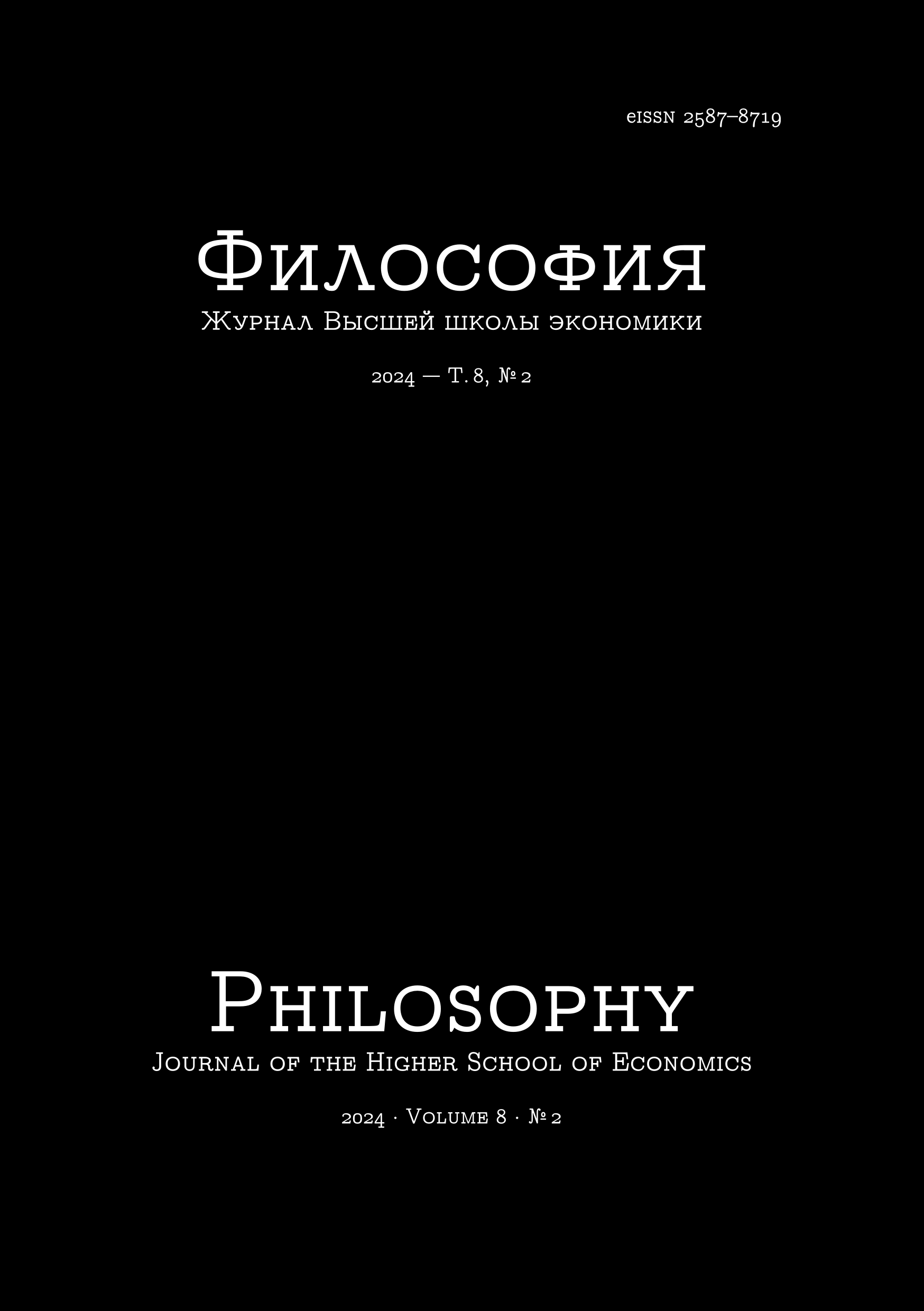Philosophy. Journal of the HSE. Vol. 8 No 2
Abstract
We are pleased to present the second issue of the journal “Philosophy” for 2024. This is already the eighth year of our journal’s existence. Over the past years, we have achieved quite a lot. The journal is indexed in several large databases, downloaded and read, and, importantly, people write to it. We, as always, adhere to the presumption of open science, and accept, with equal interest, articles from venerable scientists and young authors alike. We also maintain thematic openness: since we decided to move from thematic issues to a section-based structure, each new issue delights with its diversity.
This issue opens with a small section devoted to the history of thought, which includes four texts. Maria Ponomareva's article is dedicated to legal and theological discourse about power at the court of King Charles V of France. The focus is on two figures: the famous translator of Aristotle, Nicolas Oresme, and the anonymous author-compiler of the treatise known as “The Gardener’s Dream.” The publication continues with articles based on Russian material. Andrey Teslya examines the “images of the future” among Russian socialist intellectuals over half a century, from the 1840s to the 1890s. He stresses that early Russian radicalism was characterized by an emphasis on the direct, personally realized implementation of new practices as a consequence of the need to bridge the gap between broad general ideas, the impossibility of social action and the prospects for the near future associated with one’s participation. Sergey Sergeev turns to the image of homo novus, derived from the works of Soviet scientific and social fiction, from Ivan Efremov to A. and B. Strugatsky. The section ends with a programmatic article by Victoria Lysenko, in which she presents her concept of Indian philosophy, which sums up the author’s Indological research over the past forty-five years.
Issue Number two continues with a section that combines articles on logic, phenomenology and social anthropology. Aleksandr Belikov considers in his study the three-valued implication proposed by Robert Farrell. He emphasizes that, firstly, Farrell’s implication has all the properties sufficient to classify it as a connective implication, and, secondly, being similar in some of its properties to conjunction, it can be used to formally model some of the features of understanding conditional statements inherent in a person in the early stages of the development of their cognitive abilities. Tatyana Ryabushkina's article is devoted to the study of an approach for researching subjectivity as a condition for the possibility of conscious experience, which does not allow, on the one hand, the objectification of the subject of knowledge, considering it as a thing among other things of the conscious world, and on the other, its formalization and elimination. Ekaterina Melnikova's research is dedicated to the doctrine of meaning and meaning in the philosophy of Husserl, Heidegger and Lask. The author shows that Husserl, Heidegger and Lask develop similar intuitions in their works, which make the study of the phenomenon of meaning one of the central elements of their philosophical teachings. Finally, Olga Ivashchuk stresses two methodological figures, the core of which is a logical contradiction: the double-bind construction introduced by G. Bateson, which is aimed at eliminating the contradiction using Russell’s theory of types, and the Hegelian logical form of contradiction, work with which presupposes a culture of movement in contradictions and the ability to resolve them.
The last part of the “Research” section is formed by a small Varia section, which includes four articles. Mikhail Adamov considers the concept of “epistemic responsibility” as the ability of a subject to perceive themself as an agent of the cognitive process, trusting their mental capacities, and independently developing the rules of achievement and criteria for the success of their cognitive activity. Maxim Miroshnichenko discusses the concept of the virtual in its connection with ethics and, using the example of immunology, shows how virtuality determines the self and individuality of humanity and other forms of life. Boris Pozdnyakov and Evgeny Nenadyshchuk turn to the analysis of the philosophical concepts of Gilles Deleuze and Bernard Stiegler.
The issue continues with the traditional section “Translations and Critical Editions”, which this time presents two materials: the first part of George Dalgarno’s treatise “The Art of Signs” and an article by T.G. Huxley "Agnosticism". Both translations are accompanied by two extensive researches compiled by Natalia Osminskaya, Emil Rakhmankulov and Daniil Lavrischev.
The issue ends with a large-scale review written by Alexander Pavlov on the recently published book by Alissa Burger.
A.M.
Downloads

Copyright (c) 2024 Philosophy Journal of the Higher School of Economics

This work is licensed under a Creative Commons Attribution-NonCommercial 4.0 International License.





